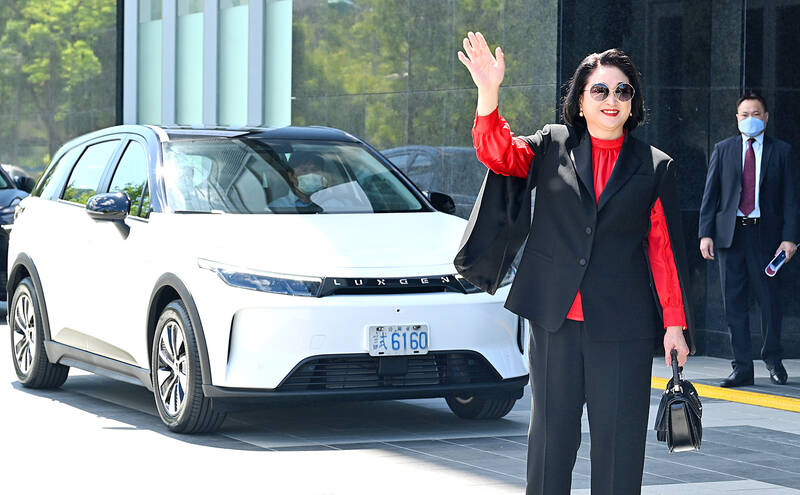Foxtron Vehicle Technologies Co (鴻華先進), an electric vehicle development venture between Hon Hai Precision Industry Co (鴻海精密) and Yulon Motor Co (裕隆汽車), yesterday said it is on schedule to deliver its new electric vehicle, the Model C, but the vehicle’s commercial launch will hinge on the decision of its first customer, Luxgen Motor Co (納智捷汽車).
Foxtron’s statement came after Yulon president Yao Chen-hsiang (姚振祥) told reporters on Thursday that it would be a challenge for the automaker to ship the latest electric model, code-named the Luxgen N7, to Luxgen at the end of this year. Yulon is in the process of conducting a series of tests including safety tests on the new all-electric sports utility vehicle, Yao said.
The Luxgen N7 is based on the Model C prototype developed by Foxtron. Yulon, the parent company of Luxgen, manufactures electric vehicles for Luxgen and some gasoline-fueled cars for Nissan Motor Corp. Since Luxgen started taking preorders in September last year, the company has received about 20,000 preorders for the N7 model, which carries a price tag of about NT$1 million (US$30,990.45), which is less than prices of other electric vehicles on the market.

Photo: Yen Chen-hui, Taipei Times
Foxton said in a statement that “the development of the Model C progresses well on schedule.”
It plans to deliver the model to its customers as previously arranged, it said.
However, the launch of the Luxgen N7 should follow Luxgen’s plan, the statement said.
The Model C was slated to enter mass production in the fourth quarter of this year, Hon Hai said earlier this year.
Hon Hai targeted 10 percent of the nation’s new car market at about 200,000 units per year, company chairman Young Liu (劉揚偉) told investors in May.
Liu doubles as chairman of Foxtron.
Foxtron in July received approval from the Taiwan Stock Exchange to trade its stocks on the Taiwan Innovation Board, a secondary market that gives local start-up companies easier access to capital for business development. The approval paves the way for the debut of Foxtron shares later this month.
Foxtron reported a loss of NT$540.86 million in the first quarter of this year, according to the Taiwan Stock Exchange. The company saw its losses widen to NT$1.58 billion last year compared with losses of NT$983.1 million in 2021, the report showed.

In Italy’s storied gold-making hubs, jewelers are reworking their designs to trim gold content as they race to blunt the effect of record prices and appeal to shoppers watching their budgets. Gold prices hit a record high on Thursday, surging near US$5,600 an ounce, more than double a year ago as geopolitical concerns and jitters over trade pushed investors toward the safe-haven asset. The rally is putting undue pressure on small artisans as they face mounting demands from customers, including international brands, to produce cheaper items, from signature pieces to wedding rings, according to interviews with four independent jewelers in Italy’s main

Macronix International Co (旺宏), the world’s biggest NOR flash memory supplier, yesterday said it would spend NT$22 billion (US$699.1 million) on capacity expansion this year to increase its production of mid-to-low-density memory chips as the world’s major memorychip suppliers are phasing out the market. The company said its planned capital expenditures are about 11 times higher than the NT$1.8 billion it spent on new facilities and equipment last year. A majority of this year’s outlay would be allocated to step up capacity of multi-level cell (MLC) NAND flash memory chips, which are used in embedded multimedia cards (eMMC), a managed

CULPRITS: Factors that affected the slip included falling global crude oil prices, wait-and-see consumer attitudes due to US tariffs and a different Lunar New Year holiday schedule Taiwan’s retail sales ended a nine-year growth streak last year, slipping 0.2 percent from a year earlier as uncertainty over US tariff policies affected demand for durable goods, data released on Friday by the Ministry of Economic Affairs showed. Last year’s retail sales totaled NT$4.84 trillion (US$153.27 billion), down about NT$9.5 billion, or 0.2 percent, from 2024. Despite the decline, the figure was still the second-highest annual sales total on record. Ministry statistics department deputy head Chen Yu-fang (陳玉芳) said sales of cars, motorcycles and related products, which accounted for 17.4 percent of total retail rales last year, fell NT$68.1 billion, or

In the wake of strong global demand for AI applications, Taiwan’s export-oriented economy accelerated with the composite index of economic indicators flashing the first “red” light in December for one year, indicating the economy is in booming mode, the National Development Council (NDC) said yesterday. Moreover, the index of leading indicators, which gauges the potential state of the economy over the next six months, also moved higher in December amid growing optimism over the outlook, the NDC said. In December, the index of economic indicators rose one point from a month earlier to 38, at the lower end of the “red” light.